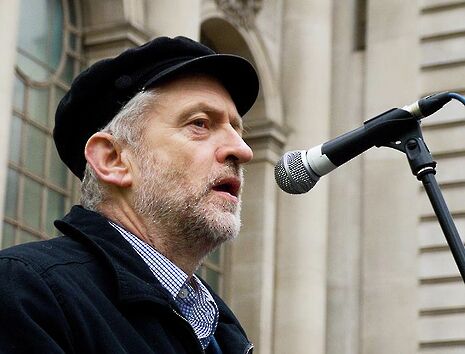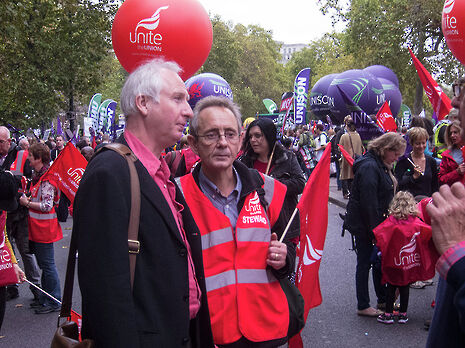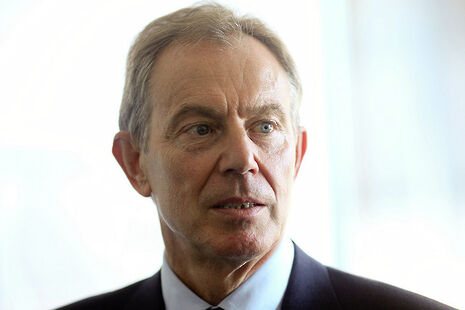Controversial Corbyn surges as Labour splits apart
Jeremy Corbyn has been accused of anti-Semitism and has been dubbed “fucking awful” for connections to Islamists, but still leads the contest

There are deep internal divisions and mutterings of a coup d’état. The national office are scouring for what they call "infiltrators" among the new registered supporters. Blair and Brown have resurfaced to make desperate appeals to the Labour membership on the importance of seeking power. And, here in Cambridge, there are profound splits over the party’s future.
Labour finds itself in a crisis that threatens its very position in British politics.
In the days following Ed Miliband’s resignation, it was largely assumed that the leadership contest would be yet another straightforward competition between members of the previous government.
But then Jeremy Corbyn stepped forward, and Labour’s “soporific” election “burst into life”, according to Tom Quinn, a lecturer at the University of Essex.
The MP for Islington North is, according to YouGov, currently 32 points clear of his rivals. He has received considerable praise for his ideological commitment and deviation from the neoliberal orthodoxy.
Having watched a lot of interviews with him recently, Corbyn, at least superficially, seems to be an affable individual who refuses to engage in personalistic politics and does not – shock horror – come across as a conspiracy theorist.
Nevertheless, his surge in popularity has seen him attract extreme reactions.
Former Cambridge student, comedian and Labour member Robert Webb, one half of the comedy duo Mitchell and Webb, recently launched a Twitter tirade against Mr. Corbyn.

He told his 375,000 followers that Corbyn was “fucking awful”, and criticised him for backing Islamists, wanting to leave NATO, and desiring “to spend a fortune on renationalising stuff instead of keeping Sure Start centres open”.
Webb believes Corbyn is “totally marooned” in the 1980s, leaving the Tories to maintain power as they did back then.
“Lots of people suffered while the Left kept to their splendid principles. Fuck that.”
Within Cambridge itself, there is significant discord.
Rory Weal, chair of the Cambridge Universities Labour Club (CULC), claims that the “Corbyn phenomenon” has exploded due to the deep divisions shown by Labour’s confused stance on the Welfare Reform Bill when 48 MPs, including Corbyn, rebelled.
Weal argues that Labour have been left a party “stumbling and clutching for political relevance, and becoming deeply polarised in the process”.
However, this discord isn’t limited to the parliamentary party.
Imogen Shaw, Publicity Officer for CULC, told Varsity that due to “such a diverse range of first preferences” the organisation could not make a “definitive” choice when it comes to backing a candidate.
In contrast, CULC's Oxford equivalent, OULC, has come out in favour of Corbyn.
One CULC member, who asked to remain anonymous, told Varsity that within the group “there are a fair number of Corbynite fanatics who want to plunge Labour into similar depths of despair as we encountered in the 1980s”.
In contrast, Mr Corbyn has drawn support from Professor Mary Beard. She said that while he would not make the best Prime Minister, he plays the vital role of making Labour "think about what it actually stands for”.
This is crucial given that it has been argued that for the sake of British politics and accountability Labour cannot become a pale imitation of the Tories. Former minister Norman Baker has even warned that we are in danger of becoming a “one-party state.”
While others see Corbyn’s economic policies as impractical, a fellow academic of Beard’s at Cambridge, Professor Michael Kitson, has also given the Islington MP encouragement. He argues that his policies – dubbed ‘Corbynomics’ – are perfectly credible.
Professor of Politics at Cambridge, David Runciman, echoes this by arguing in the London Review of Books that “a surprisingly wide swathe of the public” supports his policies.
However, Runciman also argues that Labour doesn’t need disruption, and that it is “nearly impossible” to imagine him carrying out the day-to-day role of PM.

Elsewhere in Cambridge, local MP Daniel Zeichner has declared support for Yvette Cooper, despite attempts by some members of CULC to persuade him to support Corbyn.
Ultimately, Zeichner has opted to support the Shadow Home Secretary – praising her “experience and gravitas” – because he wants a female leader and believe she will be a “highly credible” PM.
When asked about his view on Cooper’s campaign, which has been criticised for emphasising the childlessness of Liz Kendall, Mr Zeichner said – in the typically equivocal style of politicians – that while “you don’t have to have had personal experience” of issues to understand them, the issues Cooper highlighted were important.
Interestingly, Mr Zeichner, like Mr Corbyn, rebelled against his party and voted against the Welfare Reform Bill earlier this year.
However, when I questioned the Cambridge MP as to how he could therefore support Cooper – who toed the party line – he said he was “not convinced” that Corbyn wants to be Prime Minister.
Those who do think Corbyn has what it takes to be PM must bear some important arguments in mind.
Firstly, the entirety of the Bank of England’s monetary committee rejects his policy on quantitative easing, The Telegraph has reported a £100bn funding hole in his tax policy, and Afshin Rattansi of RTUK has raised concerns over Corbyn’s policies hitting the striving middle classes and not the super rich.
Corbyn has also been accused of associating with holocaust deniers by The Jewish Chronicle.
Paul Eisen, a Holocaust denier who runs the group ‘Deir Yassin Remembered’, referred to Corbyn as a ‘long-standing associate’ who attended commemorations with the group.
Unsurprisingly, Corbyn's team strongly denies this accusation.
On top of this, The Daily Mail has reported that Corbyn was caught on video calling a Muslim hate preacher an “honoured citizen”.
Returning to Cambridge, there still remain further divisions within the Left over Labour’s future leader.
Unlike Zeichner, Ashley Walsh, Leader of the Cambridgeshire Council Labour Group, has backed Andy Burnham. He argues that the former Health Secretary understands “why we lost and what we need to do to win again”.
Mr Burnham's attempts to be seen as a plain speaking “man of the people” have come under fire from some commentators.
Alex Wickham, of Guido Fawkes, has pointed out that Burnham is himself a Cambridge graduate who became a special advisor before successfully standing for election.

Most recently, Tony Blair emerged to try and persuade voters from supporting Corbyn, saying that those who do need a “heart transplant”.
It is difficult to see whether this will make much of an impact given that his standing is “low” in his party and few PM’s have faced such “hostility” as Blair, according to Sir Anthony Seldon in a recent piece on why the former Labour leader is so unpopular.
One does not need to look far for such an answer, however. Not long ago, Blair allegedly demanded £330,000, including £80k in expenses, to speak at a world hunger conference.
Unsurprisingly, Blair’s views have been echoed by the equally popular Alastair Campbell, former spin-doctor to the Labour PM.
So where do things stand?
Currently, polling shows that Corbyn is most popular across all parties, including UKIP supporters.
However, at the same time a group called ‘The Resistance’ is supposedly developing – a group of Labour MPs who are predicted to stage a coup d'état to overthrow Corbyn should he succeed.
Then there’s Liz Kendall, who has no chance of winning, and the supposedly “robotic” Yvette Cooper who has been backed by The Guardian.
This prompted hostile responses from readers, one of whom commented “shame on you, Guardian” and went on to call the newspaper as “establishment” as Cooper.
Meanwhile, Burnham seems to be chasing his rival’s supporters with claims to renationalise the railways and a desperate promise to include Corbyn in his team if he wins.
This has therefore culminated in what many outlets have called a fully-fledged “identity crisis” for Labour. The presence of a candidate outside the norm has seen Labour pulled taut, with a possibility of serious splintering.
If Corbyn wins on 12th September, Blair has predicted that Labour will be out of power for 20 years.
The contest therefore may be one of electability versus ideology.
Ultimately, whatever one’s personal opinion, it seems difficult to disagree with Professor Runciman’s argument that Labour currently faces two choices: “unsustainable inspiration or uninspired continuity”.
 News / Eight Cambridge researchers awarded €17m in ERC research grants27 December 2025
News / Eight Cambridge researchers awarded €17m in ERC research grants27 December 2025 News / Clare Hall spent over £500k opposing busway 24 December 2025
News / Clare Hall spent over £500k opposing busway 24 December 2025 Comment / League tables do more harm than good26 December 2025
Comment / League tables do more harm than good26 December 2025 News / Caius mourns its tree-mendous loss23 December 2025
News / Caius mourns its tree-mendous loss23 December 2025 Comment / The ‘class’ of Cambridge24 December 2025
Comment / The ‘class’ of Cambridge24 December 2025









